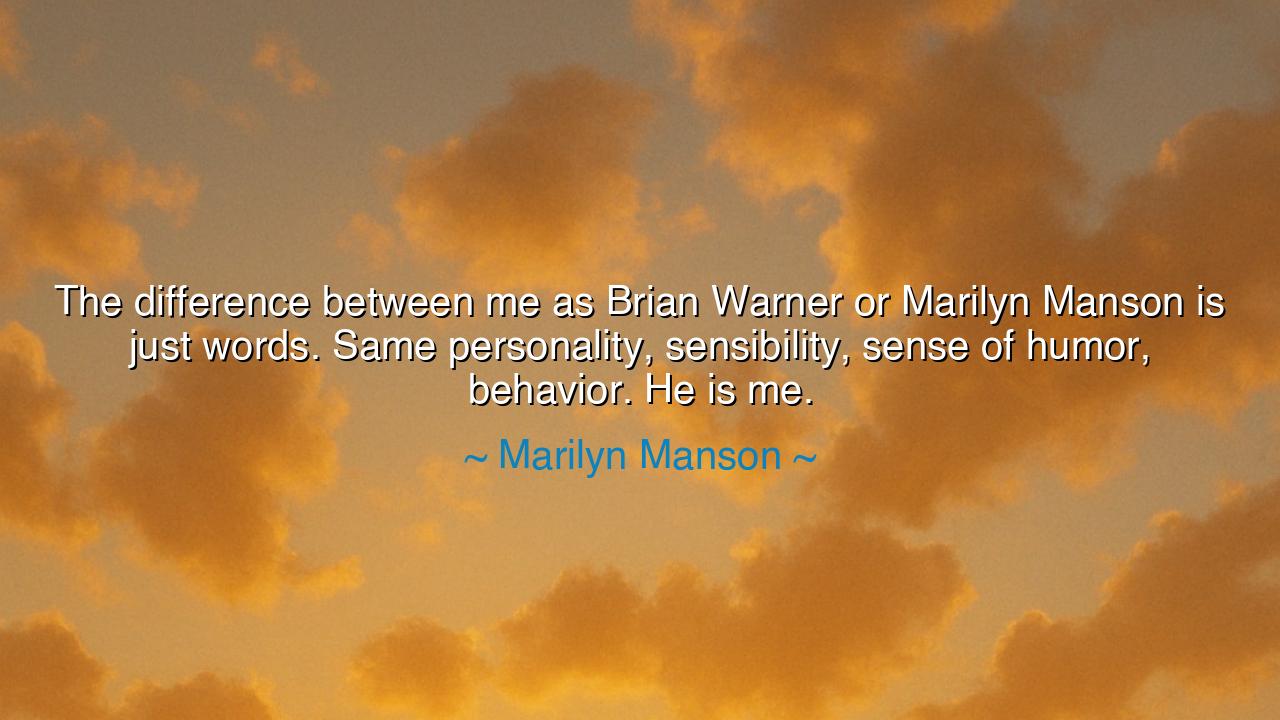
The difference between me as Brian Warner or Marilyn Manson is
The difference between me as Brian Warner or Marilyn Manson is just words. Same personality, sensibility, sense of humor, behavior. He is me.






Hear the words of Marilyn Manson, born Brian Warner, who said: “The difference between me as Brian Warner or Marilyn Manson is just words. Same personality, sensibility, sense of humor, behavior. He is me.” These words rise from the shadowed edge of identity, echoing the eternal struggle between the mask and the man. In them lies the wisdom of one who has looked deeply into the mirror and found not two faces—but one. For what Manson speaks of is not the artifice of disguise, but the unity of the self, the unbroken thread that weaves through every role a person may wear.
In the ancient world, the poets called this the duality of the soul—the battle between who we are and who we present to the world. But Manson, in his stark and fearless confession, tears away the veil and proclaims: there is no battle. The artist and the man, the name and the body, are one flame in two lamps. The transformation from Brian Warner to Marilyn Manson was not a birth of fiction, but the awakening of truth. The costume and the makeup, the music and the chaos—these were not walls to hide behind, but weapons to reveal what already lay within.
The ancients would have understood him well. When the Greek actor stepped upon the stage, he wore a mask not to conceal himself, but to amplify his essence. The word persona, from which we draw our modern “person,” meant precisely that—a mask through which the soul speaks. Manson’s statement echoes this timeless truth: that every name we bear, every role we play, is merely a word, a vessel for the spirit that remains unchanged beneath. To call him “Brian Warner” or “Marilyn Manson” is to describe the same fire under different skies.
There is a tale of Alexander the Great, who once donned the armor of Achilles and declared that he could feel the spirit of the ancient hero living through him. Yet his generals knew that it was not the armor that made Alexander mighty, but the belief within him that greatness could take form. So it is with Manson. His transformation was not a rejection of self, but an expansion—a declaration that identity is not a prison, but a canvas. He understood that to express truth, one must sometimes take on myth. To become fully human, one must dare to become larger than life.
But this revelation carries a warning as well. For there are many who wear masks and forget the face beneath. They become what the world demands, and in so doing, lose the echo of their original self. Manson reminds us that power lies not in the mask itself, but in the one who controls it. Words, he says, are the only difference. This is a profound truth: language defines perception, and perception shapes reality. Change the name, and the world changes its response—but the soul remains unmoved. The wise man does not fear names, nor cling to them. He knows that identity is fluid, and that authenticity is the current beneath its surface.
The lesson, then, is this: be whole, even in your fragments. Do not be torn between who you are and who you show to the world. Let every role, every name, every costume serve one truth—the truth of your essence. If you are gentle, let your strength carry that gentleness. If you are fierce, let your compassion temper your fire. The true self is not a single image but a symphony, and the wise learn to conduct it with harmony.
Marilyn Manson’s words are not an anthem of rebellion alone—they are a mirror for all who wrestle with identity. The poet, the parent, the leader, the laborer—all play roles that shift with time, but beneath them runs the same heartbeat. Do not flee from your masks, nor cling to them too tightly. Wear them with awareness, as the actor wears his costume—with reverence, with mastery, and with the knowledge that when the curtain falls, the soul remains.
Thus, remember: names are words, but truth is eternal. Whether you stand before the world as “Brian Warner” or “Marilyn Manson,” as saint or sinner, scholar or fool—what matters is that you know yourself. Let your outer forms serve your inner light, and let your life become one seamless expression of being. For the greatest victory is not to become someone else—but to become entirely yourself, beneath every name the world may give you.






AAdministratorAdministrator
Welcome, honored guests. Please leave a comment, we will respond soon